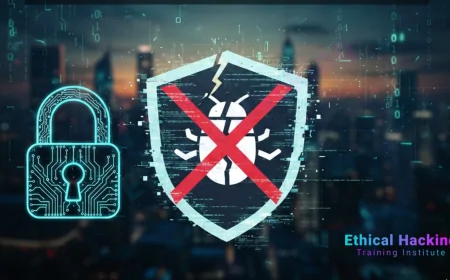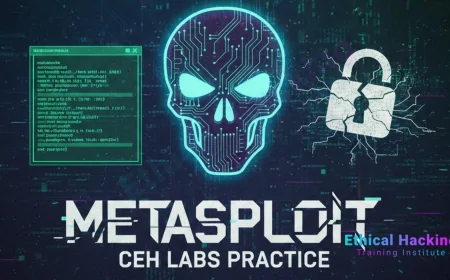What Job Roles Require OSCP? Explore Cybersecurity Career Paths After OSCP Certification
Discover the top job roles that require or benefit from OSCP certification. Learn how OSCP advances your career in penetration testing, red teaming, security consulting, and more in cybersecurity.

Table of Contents
- What is OSCP?
- Why Do Employers Value OSCP?
- Job Roles That Require or Prefer OSCP
- How OSCP Certification Enhances Your Cybersecurity Career
- Conclusion
- Frequently Asked Questions (FAQs)
The Offensive Security Certified Professional (OSCP) certification has become one of the most respected and sought-after credentials in the cybersecurity industry. Known for its rigorous hands-on penetration testing exam, OSCP validates practical skills that employers highly value. If you are considering earning the OSCP or already have it, understanding the job roles that require or benefit from this certification can help you chart a successful cybersecurity career path.
In this blog, we’ll explore the key job roles that typically require OSCP certification, what each role involves, and how OSCP opens doors in the cybersecurity field.
What is OSCP?
Before diving into job roles, let’s briefly recap what OSCP is. OSCP is a certification offered by Offensive Security that tests your ability to identify and exploit vulnerabilities in various operating systems and applications through a 24-hour practical exam. It emphasizes hands-on penetration testing skills, report writing, and problem-solving under pressure.
Why Do Employers Value OSCP?
Employers prize OSCP holders because they prove their ability to conduct real-world penetration testing independently. The certification signifies that the candidate has:
-
Strong technical skills in ethical hacking
-
Practical knowledge of penetration testing tools and techniques
-
Ability to think creatively and solve complex security problems
-
Competence in writing detailed penetration test reports
These skills are critical for many roles within cybersecurity teams, especially in offensive security and risk assessment.
Job Roles That Require or Prefer OSCP
1. Penetration Tester (Ethical Hacker)
Penetration Testers simulate cyberattacks on networks, systems, and applications to find security weaknesses before malicious hackers do. OSCP certification is often a baseline requirement because it proves practical hacking skills.
Responsibilities:
-
Conduct penetration tests and vulnerability assessments
-
Exploit vulnerabilities to demonstrate impact
-
Prepare detailed technical reports
-
Collaborate with security teams to remediate findings
2. Red Team Specialist
Red Team Specialists go beyond penetration testing by mimicking real-world adversaries to test the organization’s detection and response capabilities. OSCP forms a strong foundation for red team activities, although more advanced certs like OSCE or CRTP are often required later.
Responsibilities:
-
Simulate advanced cyberattacks using multiple techniques
-
Perform social engineering, physical security tests, and network attacks
-
Test security controls and incident response mechanisms
-
Provide actionable recommendations for improvement
3. Security Consultant
Security Consultants analyze security postures of client organizations and recommend improvements. OSCP certification demonstrates the ability to identify vulnerabilities practically, making consultants more credible.
Responsibilities:
-
Conduct security audits and penetration tests
-
Advise clients on risk mitigation strategies
-
Develop security policies and best practices
-
Deliver presentations and training sessions
4. Vulnerability Assessment Analyst
While vulnerability assessors may not always require OSCP, those with it stand out as they bring hands-on exploitation skills to the role. They scan and assess systems for known vulnerabilities, often supporting penetration testing teams.
Responsibilities:
-
Perform automated and manual vulnerability scans
-
Prioritize vulnerabilities based on risk
-
Collaborate with penetration testers to verify exploits
-
Assist in remediation tracking and reporting
5. Security Researcher
Security Researchers identify new vulnerabilities, develop exploits, and analyze malware. OSCP certification aids in mastering offensive techniques needed for research roles.
Responsibilities:
-
Discover zero-day vulnerabilities
-
Write proof-of-concept exploits
-
Analyze and reverse engineer malware
-
Publish research findings and advisories
6. Incident Response (IR) Analyst
Though more defensive, IR Analysts benefit from OSCP’s offensive knowledge. Understanding attacker methods helps them analyze incidents more effectively.
Responsibilities:
-
Investigate security breaches and incidents
-
Analyze attack vectors and malware behavior
-
Coordinate remediation and recovery efforts
-
Develop detection rules and playbooks
7. Cybersecurity Engineer
Cybersecurity Engineers design and implement security solutions. OSCP certification can complement this role by providing insight into attack methods, allowing engineers to build stronger defenses.
Responsibilities:
-
Design network and system security architectures
-
Implement security controls and monitoring tools
-
Conduct threat modeling and risk assessments
-
Support penetration testing and red team exercises
8. Application Security Engineer
Application Security Engineers focus on securing software and web applications. OSCP certification helps by equipping professionals with skills to identify code-level vulnerabilities and perform application-level penetration testing.
Responsibilities:
-
Conduct code reviews and security testing
-
Collaborate with developers to fix vulnerabilities
-
Develop secure coding guidelines
-
Automate security testing in CI/CD pipelines
How OSCP Certification Enhances Your Cybersecurity Career
-
Career Advancement: OSCP is widely recognized by employers and can significantly improve your chances of promotions or salary hikes.
-
Skill Validation: It validates your practical knowledge, making you more confident and credible in technical interviews.
-
Diverse Opportunities: OSCP opens doors in multiple cybersecurity disciplines, including penetration testing, red teaming, and consulting.
-
Networking: Joining the OSCP community connects you with other professionals and job opportunities globally.
Conclusion: Is OSCP the Right Certification for Your Career Path?
If you aim to build a career in offensive security, penetration testing, or related cybersecurity roles, OSCP is almost a must-have certification. It equips you with the practical skills needed to excel and proves to employers that you can handle real-world challenges.
Whether you want to be a Penetration Tester, Red Team Specialist, Security Consultant, or even a Security Researcher, OSCP provides a strong foundation for your journey.
For those based in Pune or anywhere else, enrolling in a reputed training institute that offers comprehensive OSCP preparation can be your gateway to a rewarding cybersecurity career.
FAQs:
What job roles require OSCP certification?
Many roles in cybersecurity, especially those focused on testing and securing systems, look for candidates with this certification. Positions like penetration tester, security consultant, and red team member commonly require it.
Is OSCP certification necessary to become a penetration tester?
While not absolutely mandatory, having this certification greatly enhances your chances by proving practical skills that employers highly value.
Can OSCP certification help me become a red team specialist?
Yes, it provides the hands-on experience needed to perform offensive security tasks typical of red team roles.
What skills does OSCP validate for cybersecurity professionals?
It confirms your ability to identify weaknesses, exploit them safely, and understand various attack vectors in real-world scenarios.
How does OSCP certification improve my job prospects in cybersecurity?
It distinguishes you as someone who can effectively simulate attacks and think like an attacker, which many companies find invaluable.
Is OSCP recognized globally by employers?
Absolutely, this certification has international recognition and is respected across the cybersecurity industry worldwide.
Can OSCP holders work in incident response roles?
Though the focus is on offensive security, the knowledge gained helps in understanding attack methods, which is useful in incident response situations.
What is the average salary for OSCP certified professionals?
Salaries vary widely depending on location and experience, but certified individuals often earn higher than average salaries compared to non-certified peers.
Are there any prerequisites to take the OSCP certification?
There aren’t strict requirements, but having foundational knowledge in networking and operating systems will make the journey smoother.
How does OSCP compare to other cybersecurity certifications?
This certification is more focused on practical skills rather than just theory, which sets it apart in the eyes of employers.
What industries value OSCP certification the most?
Sectors like finance, government, healthcare, and technology firms prioritize professionals with this credential due to their high security demands.
Can OSCP certification help me transition from IT to cybersecurity?
Yes, it provides a solid foundation in security testing that can open doors for IT professionals wanting to move into security roles.
Is OSCP suitable for beginners in cybersecurity?
It’s challenging and generally better suited for those with some background knowledge, but determined beginners can succeed with dedication.
How long does it typically take to prepare for the OSCP exam?
Most candidates spend a few months preparing, balancing study and hands-on practice to master the material.
What job roles can I apply for immediately after OSCP certification?
Entry-level penetration tester, security analyst, and vulnerability assessor are common positions accessible after earning this certification.
Does OSCP certification cover web application security?
Yes, it includes aspects of testing web-based systems among other attack surfaces.
Can OSCP certification help with freelance cybersecurity jobs?
Certainly, it adds credibility and demonstrates skills that freelance clients look for in security consultants.
Are there advanced certifications to pursue after OSCP?
Many professionals continue with more specialized or senior-level certifications to deepen their expertise.
How does OSCP training improve hands-on hacking skills?
The training focuses on practical labs and real-world scenarios, helping you learn by doing rather than just reading theory.
What is the role of an ethical hacker with OSCP certification?
An ethical hacker identifies security weaknesses to help organizations strengthen their defenses before malicious actors can exploit them.
Can OSCP holders become security consultants?
Yes, they often provide expert advice on improving security posture based on their penetration testing knowledge.
Is OSCP useful for professionals interested in malware analysis?
While it’s mainly about penetration testing, the skills gained can complement malware analysis knowledge.
What is the difference between penetration testers and red team specialists?
Penetration testers focus on finding vulnerabilities, while red team specialists simulate full-scale cyber attacks to test organizational readiness.
How does OSCP certification impact career growth and promotions?
Holding this certification can accelerate promotions by proving your ability to handle complex security tasks.
Can OSCP help in securing roles in business cybersecurity?
Yes, companies look for certified professionals to manage risk and protect business assets effectively.
Does OSCP include training on report writing and documentation?
The course emphasizes the importance of documenting findings clearly to communicate risks to stakeholders.
Are OSCP certified professionals in demand in India, especially Pune?
With the growth of the cybersecurity sector in India, demand for certified experts is increasing rapidly in cities like Pune.
Can OSCP certification lead to roles in vulnerability assessment?
Yes, identifying and assessing weaknesses is a key part of the certification’s focus.
What tools and techniques are covered in OSCP training?
Various open-source and commercial security tools are included, along with methodologies for testing and exploitation.
How do employers verify OSCP certification during hiring?
Employers typically check certification status through official channels or request proof from candidates during recruitment.
What's Your Reaction?
 Like
1
Like
1
 Dislike
0
Dislike
0
 Love
0
Love
0
 Funny
0
Funny
0
 Angry
0
Angry
0
 Sad
0
Sad
0
 Wow
0
Wow
0

















